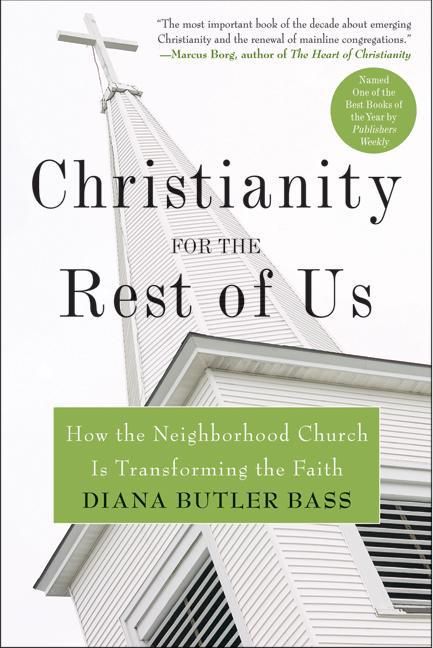
Christianity for the Rest of Us Blog 1
Christianity for the Rest of Us Blog 2
As I previously blogged, this subject is close to my heart and central to the needs of most of us in the protestant mainline; this book gives me so much hope! The RevGals' basic consensus was like mine—this book gives all of us hope! I love the RevGals' passion for unity in diversity, too. Just like mine!
A sudden memory inspired this third blog on this book...
Probably within the past ten years, but likely at the far end of that number, one of the national news magazines – Time, Newsweek or U.S. News – had an extensive cover feature on the American Protestant Mainline. It's been a while since I subscribed to any of those (mainline) mags, but I seem to recall purchasing a copy on the newsstand, so maybe I still have it somewhere. They featured the same denominations as Christianity for the Rest of Us, with the addition of Baptists – of which they said "there are many," but I believe most of the Baptist churches in the study were from the liberal American Baptist Convention-USA, headquartered in Valley Forge Pennsylvania. (You can find direct links to the other study denomination links in my Blog 1.) The news mag article(s) described local churches very similar to those DBB describes, and I remember the striking phrase, "Any of these churches is a wonderful place to be!"
Clearly I'm still in lots of pain over the too many times I'd been excluded from participation in churches over the past too many years, but I'm always saying things like, "I'm not claiming any of this remotely is my fault, because no matter how I parse it, people have been just plain rude and just plain considered me a threat." However, my segue to that and similar statements usually is something like, "A huge part of the answer is these have been the wrong kinds of churches." By that I'm not saying any of these mainline or whatever or whichever has been theologically erroneous or otherwise not appropriate, but the social and cultural settings haven't been where reasonably I could expect my abilities and background to be appreciated and exploited. It offends my still sometimes working-class sensibilities, but despite the fact there always would be exceptions, a church in the Harvard Square or UC Berkeley environs would have been very different with a radically differing outcome in terms of their welcoming (and yes, exploiting) my gifts and regular participation.
In my second blog I'd intended to mention how much I loved the concept of people and groups being politically neither Blue nor Red but Purple, and how I love the implications of early Christians adopting the royal color purple for radical, subversive usage and intent in seeking to follow The Way. In that era in that part of the world, only royals were allowed to wear purple; remember Lydia from Thyatira we read about in Acts 16? Lydia's story happens right after Timothy joins up with Paul and Silas and just before Paul and Silas end up in prison; the entire passage is magnificently evocative:
Acts 16On the Sabbath, expecting to "find a place of prayer" at the river, they also found a place for baptism, where people formally could separate from former allegiances and lords, and officially be baptized into the reign of heaven on earth under the Lordship of the crucified and risen Jesus Christ—a Lord at once both royal and subversive! Lydia, the first European Christian was a woman, and one who "dealt in" clothing for kings but dared publicly sign onto the subversive lifestyle of the followers of Jesus Christ. In that era of the nascent church, Christianity provided a radically alternative perspective: politically to the point of sedition and socially to the extent of welcoming and actually including all comers. Lydia, newly-baptized and a merchant who routinely interacted with high and mighty royalty, knew God called her to hospitality and community.
13 On the Sabbath we went outside the city gate to the river, where we expected to find a place of prayer. We sat down and began to speak to the women who had gathered there. 14 One of those listening was a woman named Lydia, a dealer in purple cloth from the city of Thyatira, who was a worshiper of God. The Lord opened her heart to respond to Paul's message. 15 When she and the members of her household were baptized, she invited us to her home. "If you consider me a believer in the Lord," she said, "come and stay at my house." And she persuaded us. NIV
Here's the 1st Peter scripture from Blog 1:
1 Peter 2:9-10The end of another incomplete blog (what else is new), but here it is, nonetheless.
But you are a chosen, elect people (birthed, descended), a royal priesthood, a holy nation (ethnic), a people (folk) belonging to God, that you may declare the praises of him who called you out of darkness into his wonderful light. Once you were not a people (folk), but now you are the people (folk) of God; once you had not received mercy, but now you have received mercy.
By Leah, baptized into Jesus Christ and hoping to find a church that's a wonderful place to be.

No comments:
Post a Comment
thanks for visiting—peace and hope to all of us!